After moving from Mumbai to Coimbatore in 2009, due to a financial crisis she couldn’t afford good dermatologists, and was looking for good skincare products. When she found a nice ‘natural’ product, her husband Pritesh happened to see the ingredients. Given his knowledge of the petrochemical industry, he was certain that it wasn’t ‘natural’. When they checked with family and friends, they realised that people had no idea about what went into the skincare and haircare products they used.
Asher, then a fashion designer, and Pritesh, who worked in his father’s petrochemical business, started playing around with ingredients in their kitchen and building products. What began as a small experiment in their home ended up becoming a brand—Juicy Chemistry.
In 2014, the Ashers started researching ingredients that went into every possible personal care product—from lip balms to face washes. “Pritesh was trying to understand why every product needed these ingredients and what could be eliminated. The first ingredient that he isolated was water. The minute we removed water from the formulation, we didn’t have to use preservatives," says Asher.
Soon, they started making products like sugar scrubs and face masks with ingredients like fuller’s earth, oatmeal, charcoal and almond meal, which weren’t popular in India then.
![]() After testing out some of their products with friends and family and getting positive reviews, the duo began selling them at farmers’ markets. “This helped us understand what consumers were thinking, what we were missing out on, and other concerns they wanted us to make products for," he says. Customers who bought them once came back for more products. This is when they knew that this ‘experiment’ had the potential to become a business.
After testing out some of their products with friends and family and getting positive reviews, the duo began selling them at farmers’ markets. “This helped us understand what consumers were thinking, what we were missing out on, and other concerns they wanted us to make products for," he says. Customers who bought them once came back for more products. This is when they knew that this ‘experiment’ had the potential to become a business.
Unlike most other startups that launch an entire product line, Juicy Chemistry was working on one product at a time. “We never thought of manufacturing a product line and doing a grand launch," says Asher, adding that the experiments and research took 10-11 months. During this time, they hired their first employee, the house help. “She noticed we were struggling to do so many things in one go—from manufacturing to packaging and selling. It was a four-member team [they had hired one more person] for the first couple of months," says Pritesh.
By the time Juicy Chemistry’s website went live in 2015, they had close to 15 people in the team. It’s now a 50-member squad. And unlike a lot of other personal care brands, manufacturing is in-house for the company. While Asher looks after social media, PR and coming up with new product ideas, Pritesh handles finance and manufacturing.
The company has grown over the last seven years, with a presence in Australia, France, South Africa, Nepal, Singapore and Mauritius. It has total funding of ₹548 crore to date. The brand has a solid expansion plan, says Pritesh. “We’re looking at going live on amazon.com in the US and amazon.ae in the UAE. We are also working on a sensitive skincare line now, and looking at organic makeup in the long run," he says. In FY21, Juicy Chemistry clocked a turnover of ₹25 crore and is looking to close FY22 at ₹50 crore. “Juicy Chemistry has been everything in the last seven years… once we saw that the brand was gaining scale, there was no looking back," says Asher.
![]() Vineeta Singh (left) and Kaushik Mukherjee of Sugar Cosmetics
Vineeta Singh (left) and Kaushik Mukherjee of Sugar Cosmetics
Image: Aalok Soni
Another couple—Vineeta Singh and Kaushik Mukherjee—has also disrupted the makeup market in India, with Sugar Cosmetics. However, unlike Juicy Chemistry that was born out of an experiment, Singh and Mukherjee, both IIM-Ahmedabad graduates, had pervious entrepreneurial experience.
![]() They launched an ecommerce company Fabbag in 2012 that used a subscription model to sample beauty and personal care products. In 2015, using the insights they got from the 200,000 women who used the website, the duo decided to launch Sugar to address the pain points Indian women were facing.
They launched an ecommerce company Fabbag in 2012 that used a subscription model to sample beauty and personal care products. In 2015, using the insights they got from the 200,000 women who used the website, the duo decided to launch Sugar to address the pain points Indian women were facing.
This was a time when, recalls Singh, “Indian women, especially younger women, were starting to wear makeup more regularly, and had started shopping online and spending time on social media." Women were looking for products that worked better for the weather conditions and skin tones here. The products they launched, whether it was the foundation stick or a perfect red lip colour, got them a lot of traction. Sugar Cosmetics clocked a turnover of ₹105 crore in FY20 and is on track to close ₹300 crore this year.
Given that both of them had been entrepreneurs separately, why work together now? Mukherjee explains, “Our skills are complementary and we had an overlap in our interest areas. I wanted to leverage the internet to sell directly to consumers and Vineeta was passionate about building something for women."
It wasn’t easy, though. One of the many challenges the duo faced in the early days was funding. “Investors were not comfortable with investing in the company because they thought of it as a ‘family-run business’ and doubted if we’ll manage hiring professionals," recalls Mukherjee. They also faced resistance in launching a consumer-facing brand in a market that was full of legacy brands like Hindustan Unilever, P&G and L’Oreal.
Both of them had learnt the hard way from their past entrepreneurial stints. “I had a detailed business plan… we were to go for an IPO in five years. But in reality, it takes a lot longer," says Singh. With Sugar, both of them have set a more realistic timeline. “We learnt that you need to have a long-term vision and be patient. Back then, we were impatient and wanted to make money soon. That doesn’t work," adds Mukherjee. Another learning was hiring right, and investing in good employees.
“Today," says Singh, “social media is at the heart of the beauty and personal care market. Ecommerce adoption has also accelerated in the last two years due to the pandemic, with 60 percent of our online consumers from tier 2 and 3 cities." Sugar has 1.7 million followers on Instagram and the company gets more than 300 million impressions on their Instagram and YouTube pages. With a total funding of ₹241 crore so far, it has added 20,000 offline stores in the last six months, banking on a solid post-pandemic recovery. Globally, the brand is present in Russia and the Middle East. While they are experimenting with products in the personal care space, Mukerjee says, “We are resisting spreading ourselves too thin, we aren’t in a rush to expand."
![]() WOW Skin co-founder Manish (right) and Karan Chowdhary
WOW Skin co-founder Manish (right) and Karan Chowdhary
Image: Hemant Mishra for Forbes India
Brothers Manish and Karan Chowdhary come from a family of entrepreneurs. They were running a computer retailing business for about 10 years, until the ecommerce revolution came to India. When players like Flipkart popped up, Manish says, “non-agile companies like ours went bust".
The downfall, however, did not stop them from bouncing back.
The Bachelor of Business Management (BBM) graduates saw an opportunity in the beauty and personal care space, when they realised that in the US, about 50 percent of these products are bought online. “This was around the same time that Amazon was planning to come to India and Flipkart had not started selling personal care products online," recalls Chowdhary.
In 2014, they set up the company, which started selling supplements for weight loss, a concept that was popular in the West. However, says Manish, “we realised it was a tough category to be in, and it was more of an educative business. While we saw great gross margins, our repeat rates were poor." It made them realise that if they aren’t agile, the company might hit the ground, again. The duo then decided to shift gears. This gave birth to Wow Skin Science in 2015, with a range of clean skincare and haircare products.
“We take our failures with a badge of honour," says Chowdhary. Their biggest learning was keeping the customer as king. “There have been times when we have contemplated looking at the balance sheet to ensure we don’t go back to a bad financial position. In those times, we remind ourselves that if we don’t keep the customer as our priority, they can fire us," says Karan. Innovating based on customer feedback has helped the company in forming its own USP.
![]() Wow Skin Science expects to clock a turnover of ₹600 crore by FY22. It has received a total funding of ₹390 crore from Chrys Capital.
Wow Skin Science expects to clock a turnover of ₹600 crore by FY22. It has received a total funding of ₹390 crore from Chrys Capital.
Like most personal care brands in India, Wow Skin Science is betting big on the omnichannel space. Since 2018-19, 15 percent of its total revenue comes from offline and 85 percent from online. They are looking to grow the offline stores’ revenue to 35 to 40 percent. Wow Skin Science is also the first Indian beauty and personal care brand to have a presence in 2,800 physical Walmart stores in the US.
Currently, the brothers are working on institutionalising the company. “We don’t want to be a founder-driven company, so we’re hiring talent from the industry to take the company to great heights," says Manish. Apart from their existing US operations, they are soon starting operations in the Middle East, Africa and Southeast Asia. “We want to make money, like everyone else, but we want to do it slowly and build something that is here to stay for the long run," he adds.
According to Statista, India’s beauty and personal care market was estimated to be $25.9 billion (₹189,231 crore) in size in 2020. It is projected to reach ₹2,389,22 crore by 2023, growing at a CAGR of 8.1 percent. “With consumers being more aware and connected to their brands and products, the one-size-fits-all approach does not work anymore. And independent homegrown brands with access to the digital ecosystem, and thus to one-on-one conversations with customers, are positioned to understand and cater to new-age consumers, which will largely drive the market," says Manvitha Janagam, investment associate, Verlinvest, who has invested in Juicy Chemistry.
While these companies are founded by either couples or siblings, they are far from what traditional family-run businesses look like. However, ‘trust’ is a factor that is a huge advantage for them, especially in a sector as competitive as beauty and personal care. One of the best parts of being co-founders, Wow Skin Science’s Chowdhary says is that, “What Manish is good at, I am not. He doesn’t know anything about the area I excel in. We complement each other with our strengths and weaknesses." Adds Pritesh of Juicy Chemistry, “It helps to have somebody who you trust to execute a certain plan of action. It saves up on a lot of your bandwidth and you can focus on your part of the business."
However, there is no work-life balance. “As entrepreneurs, we anyway take business personally and then as a couple, it only gets harder," says Singh of Sugar Cosmetics. It’s harder when you have children. Asher of Juicy Chemistry feels that sometimes they get so engrossed with work that there is a feeling of missing out and not spending enough time with the kids.
“You just have to accept that the lines between personal and professional [lives] will always remain a blur," says Mukherjee. Unlike most couples who say ‘good night’, he says with a laugh, “Our bedtime conversation is usually, ‘tomorrow morning that cheque has to be deposited’ or ‘we have a meeting at 11 am with investors’."

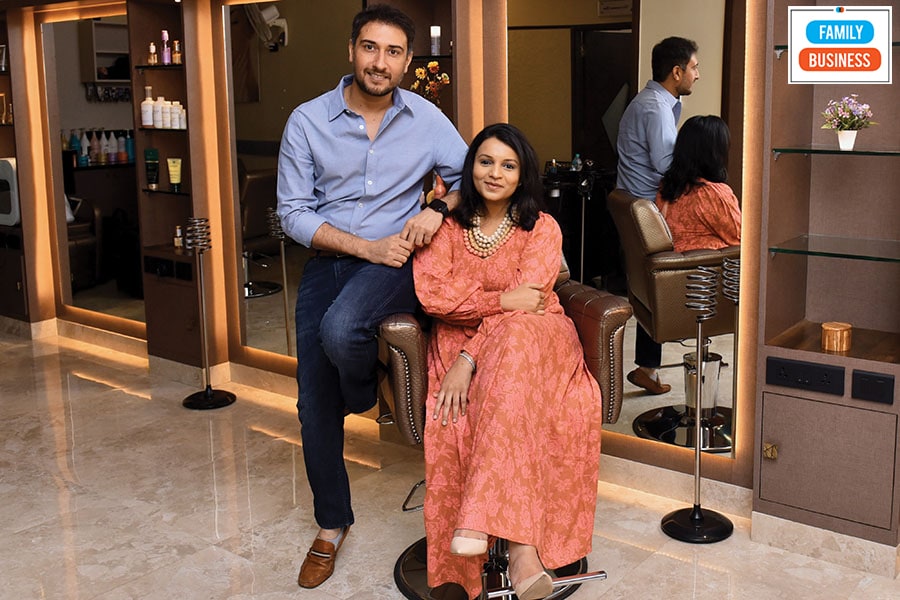 Megha (right) and Pritesh Asher of Juicy Chemistry
Megha (right) and Pritesh Asher of Juicy Chemistry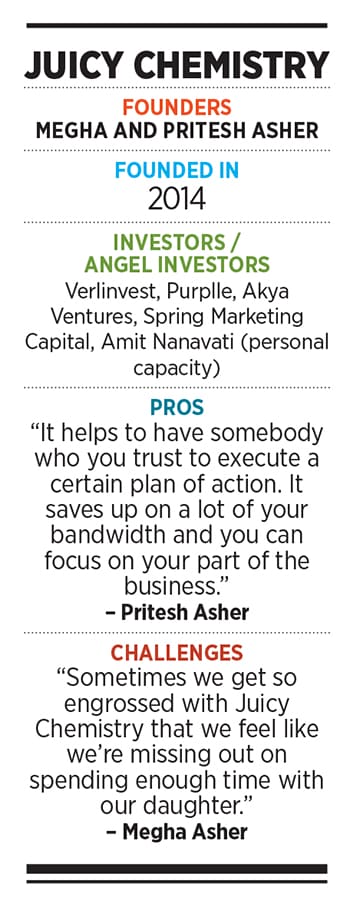 After testing out some of their products with friends and family and getting positive reviews, the duo began selling them at farmers’ markets. “This helped us understand what consumers were thinking, what we were missing out on, and other concerns they wanted us to make products for," he says. Customers who bought them once came back for more products. This is when they knew that this ‘experiment’ had the potential to become a business.
After testing out some of their products with friends and family and getting positive reviews, the duo began selling them at farmers’ markets. “This helped us understand what consumers were thinking, what we were missing out on, and other concerns they wanted us to make products for," he says. Customers who bought them once came back for more products. This is when they knew that this ‘experiment’ had the potential to become a business.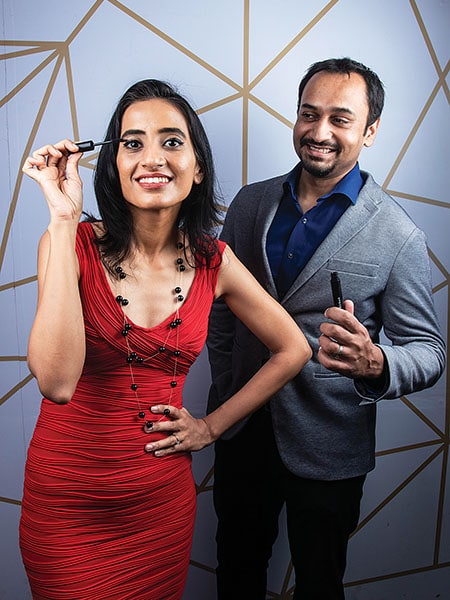 Vineeta Singh (left) and Kaushik Mukherjee of Sugar Cosmetics
Vineeta Singh (left) and Kaushik Mukherjee of Sugar Cosmetics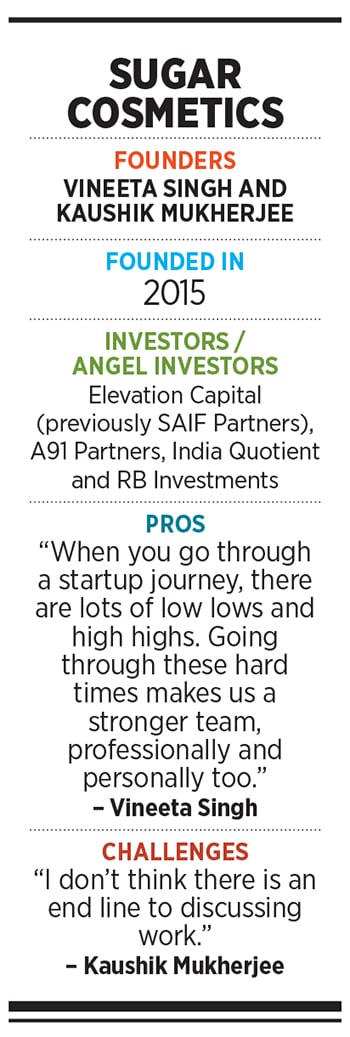 They launched an ecommerce company Fabbag in 2012 that used a subscription model to sample beauty and personal care products. In 2015, using the insights they got from the 200,000 women who used the website, the duo decided to launch Sugar to address the pain points Indian women were facing.
They launched an ecommerce company Fabbag in 2012 that used a subscription model to sample beauty and personal care products. In 2015, using the insights they got from the 200,000 women who used the website, the duo decided to launch Sugar to address the pain points Indian women were facing.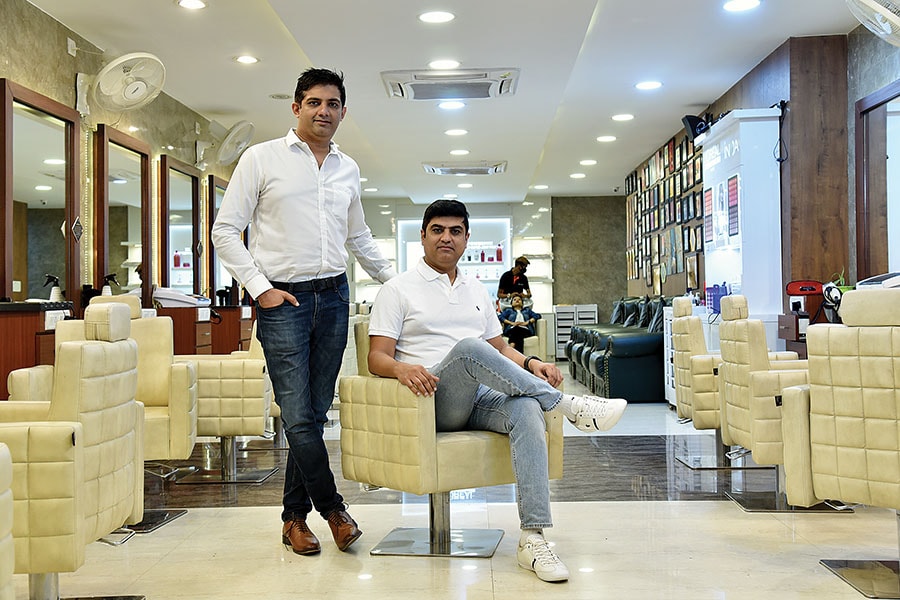 WOW Skin co-founder Manish (right) and Karan Chowdhary
WOW Skin co-founder Manish (right) and Karan Chowdhary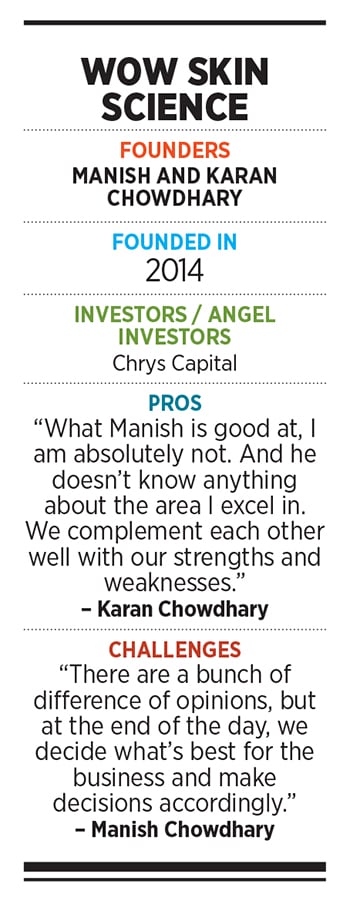 Wow Skin Science expects to clock a turnover of ₹600 crore by FY22. It has received a total funding of ₹390 crore from Chrys Capital.
Wow Skin Science expects to clock a turnover of ₹600 crore by FY22. It has received a total funding of ₹390 crore from Chrys Capital.